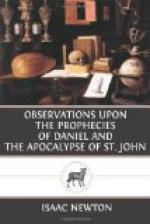[3] And in the latter time of their kingdom, when the transgressors are come to the full, a King [or new kingdom] of fierce countenance, and understanding dark sentences, shall stand up: and his power shall be mighty, but not by his own power. This King was the last horn of the Goat, the little horn which came up out of one of the four horns, and waxed exceeding great. The latter time of their kingdom was when the Romans began to conquer them, that is, when they conquered Perseus King of Macedonia, the fundamental kingdom of the Greeks. And at that time the transgressors came to the full: for then the High-priesthood was exposed to sale, the Vessels of the Temple were sold to pay for the purchase; and the High-priest, with some of the Jews, procured a licence from Antiochus Epiphanes to do after the ordinances of the heathen, and set up a school at Jerusalem for teaching those ordinances. Then Antiochus took Jerusalem with an armed force, slew 4000 Jews, took as many prisoners and sold them, spoiled the Temple, interdicted the worship, commanded the Law of Moses to be burnt, and set up the worship of the heathen Gods in all Judea. In the very same year, An. Nabonass. 580, the Romans conquered Macedonia, the chief of the four horns. Hitherto the Goat was mighty by its own power, but henceforward began to be under the Romans. Daniel distinguishes the times, by describing very particularly the actions of the Kings of the north and south, those two of the four horns which bordered upon Judea, until the Romans conquered Macedonia; and thenceforward only touching upon the main revolutions which happened within the compass of the nations represented by the Goat. In this latter period of time the little horn was to stand up and grow mighty, but not by his own power.
The three first of Daniel’s Beasts had their dominions taken away, each of them at the rise of the next Beast; but their lives were prolonged, and they are all of them still alive. The third Beast, or Leopard, reigned in his four heads, till the rise of the fourth Beast, or Empire of the Latins; and his life was prolonged under their power. This Leopard reigning in his four heads, signifies the same thing with the He-Goat reigning in his four horns: and therefore the He-Goat reigned in his four horns till the rise of Daniel’s fourth Beast, or Empire of the Latins: then its dominion was taken away by the Latins, but its life was prolonged under their power. The Latins are not comprehended among the nations represented by the He-Goat in this Prophecy: their power over the Greeks is only named in it, to distinguish the times in which the He-Goat was mighty by his own power, from the times in which he was mighty but not by his own power. He was mighty by his own power till his dominion was taken away by the Latins; after that, his life was prolonged under their dominion, and this prolonging of his life was in the days of his last horn: for in the days of this horn the Goat became mighty, but not by his own power.




